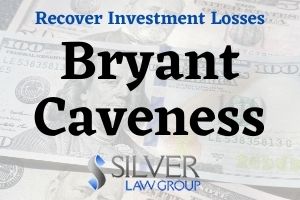Bryant Caveness, Former Ameriprise Broker, Terminated For Violations
 Bryant Caveness (Bryant Edwin Caveness CRD: #4033740) is a former registered broker and investment advisor whose last employer was Ameriprise Financial Services, LLC (CRD#:6363) of Kingsport, TN. His previous employers include Ameriprise Advisor Services, Inc. (CRD#:5979), also of Kingsport, and Morgan Stanley DW Inc. (CRD#:7556) of Purchase, NY. He has been in the industry since 1999.
Bryant Caveness (Bryant Edwin Caveness CRD: #4033740) is a former registered broker and investment advisor whose last employer was Ameriprise Financial Services, LLC (CRD#:6363) of Kingsport, TN. His previous employers include Ameriprise Advisor Services, Inc. (CRD#:5979), also of Kingsport, and Morgan Stanley DW Inc. (CRD#:7556) of Purchase, NY. He has been in the industry since 1999.
Bryant Caveness Disclosures
Bryant Caveness has 5 disclosures on his publicly-available FINRA BrokerCheck report, including 3 customer disputes, 1 regulatory, and 1 employment separation after allegations:
November, 2020: A customer dispute alleged that “Respondents placed them in precious metals and mining stocks, inverse and leveraged ETFs, and gold coins, and allege unsuitability, breach of fiduciary duty, and negligent supervision.” $230,000 in damages were requested. The dispute is pending as of this writing.
July, 2020: A regulatory disclosure states that “Without admitting or denying the findings, Caveness consented to the sanction and to the entry of findings that he refused to provide information and documents requested by FINRA in connection with its investigation into his potential receipt of checks from senior customers. The findings stated that although Caveness initially cooperated with FINRA’s investigation, he ceased doing so.” Caveness was indefinitely barred from associating with a FINRA member broker-dealer.
June, 2020: An employment separation after allegation disclosure states that Ameriprise Financial discharged Caveness. The allegations state that he “was terminated for company policy violations related to personal trade, ethics, and solicitation of exchange traded products.”
July, 2010: A customer dispute alleged “discretionary trading of unsuitable investments occurred within his portfolio.” $170,000 in damages were requested, and the case settled for $85,000.
May, 2001: A customer dispute alleged unsuitable recommendations and requested $100,000 in damages. The case settled for $37,500.
Did Your Financial Advisor Ask you To Borrow Money?
A stockbroker or financial isn’t supposed to ask a customer to borrow money. They’re also not supposed to ask clients to invest in their personal projects or sell a product that’s not approve by their firm. Brokers and financial advisors have access to a client’s financial information and have often earned their trust. A rise in elder financial fraud, including cases where a financial advisor borrowed money or stole from a customer, has been reported by the SEC and FINRA.
This issue is governed by FINRA Rule 3240: Borrowing From or Lending to Customers
(a) Permissible Lending Arrangements; Conditions
No person associated with a member in any registered capacity may borrow money from or lend money to any customer of such person unless:
(1) the member has written procedures allowing the borrowing and lending of money between such registered persons and customers of the member;
(2) the borrowing or lending arrangement meets one of the following conditions:
(A) the customer is a member of such person’s immediate family;
(B) the customer (i) is a financial institution regularly engaged in the business of providing credit, financing, or loans, or other entity or person that regularly arranges or extends credit in the ordinary course of business and (ii) is acting in the course of such business;
(C) the customer and the registered person are both registered persons of the same member;
(D) the lending arrangement is based on a personal relationship with the customer, such that the loan would not have been solicited, offered, or given had the customer and the registered person not maintained a relationship outside of the broker-customer relationship; or
(E) the lending arrangement is based on a business relationship outside of the broker-customer relationship; and
(3) the requirements of paragraph (b) of this Rule are satisfied.
Did your Financial Advisor Violate FINRA Rule 3240?
Silver Law Group represents investors in securities and investment fraud cases. Our lawyers are admitted to practice in New York and Florida and represent investors nationwide to help recover investment losses due to stockbroker misconduct. If you have any questions about how your account has been handled, call to speak with an experienced securities attorney. Most cases are handled on a contingent fee basis, meaning that you won’t owe us until we recover your money for you. Contact us today and let us know how we can help.
 Securities Arbitration Lawyers Blog
Securities Arbitration Lawyers Blog

